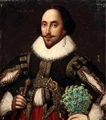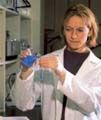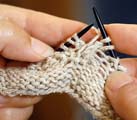


What does uncovering the true authorship of plays attributed to Shakespeare have to do with identifying our genetic ancestors or classifying new life forms? All involve the comparative analysis of long sets of data and all will benefit from a unique new analytical tool developed at Berkeley Lab under the leadership of Sung-Hou Kim in the Physical Biosciences Division. Called Feature Frequency Profiles, this new tool generates “family trees” that create an easy-to-see perspective of the relationships between groups within a large data set. For example, a family tree generated for the works of Shakesepeare cast new doubt on the Bard’s authorship of the play “Pericles.” More> ![]()
 In The News: Materials Scientist’s Research Featured in Forbes and Time Magazines
In The News: Materials Scientist’s Research Featured in Forbes and Time MagazinesTime Magazine included in its “Top 10 Scientific Discoveries of 2008” the research of Berkeley Lab materials scientist Xiang Zhang, who used nanowires grown inside a porous aluminum tube to create a sheeting 10 times thinner than a piece of paper, proving that they could wrap an object in the material and bend light waves around it, making it effectively invisible. Zhang’s work on shrinking lasers to nanoscale by creating “whispering galleries” was featured in the most recent issue of Forbes Magazine.
 General Sciences: Agreement on Actions to Improve Climate for Women
General Sciences: Agreement on Actions to Improve Climate for WomenThe directors of the Accelerator and Fusion Research Division, Nuclear Sciences Division, and Physics Division have agreed on several actions to improve the climate for women at Berkeley Lab. Their plan responds to recommendations from an American Physical Society committee on the status of women in physics, which was invited to visit the Lab's three General Sciences divisions in March of 2008. The new action plan — which includes improvements in training, mentoring, and networking opportunities — is described in a letter from the division directors. The measures will not only assist women but will be beneficial to all employees.
 Berkeley Lab is in the process of requesting that all onsite 911 cellular telephone calls be handled by the UC Police Department (UCPD) dispatch center in order to improve the response time by emergency personnel. While this request is being processed, cell phone users can use 510-486-7911 in the event of an onsite emergency. Be ready to give the 911 operator detailed information about the location of the emergency. It may be helpful to add this 10 digit number to the speed dial list on your phone. This is only an interim solution until approval is obtained to rout the Lab's onsite 911 cellular telephone calls directly to UCPD.
Berkeley Lab is in the process of requesting that all onsite 911 cellular telephone calls be handled by the UC Police Department (UCPD) dispatch center in order to improve the response time by emergency personnel. While this request is being processed, cell phone users can use 510-486-7911 in the event of an onsite emergency. Be ready to give the 911 operator detailed information about the location of the emergency. It may be helpful to add this 10 digit number to the speed dial list on your phone. This is only an interim solution until approval is obtained to rout the Lab's onsite 911 cellular telephone calls directly to UCPD.
Telephone Services will upgrade the Lab's voice mail system this Saturday and Sunday. Voice mail service will be unavailable from 6 a.m. to noon on Sunday. Information packets with information on the new CallXpress Voice Mail system and tips on preparing for the change-over are currently being mailed to employees. Messages on the old system will be available for 60 days after the upgrade. Most of the voice mail commands that are currently being used will remain the same. Call Telephone Services (x7997) or go here for more information about the new system.
 Philanthropy Club: Next Chemo Cap Project Starts Feb. 17
Philanthropy Club: Next Chemo Cap Project Starts Feb. 17The Chemo Cap Project is a charity knitting and crocheting project to help cancer patients during one of the most difficult parts of their treatment. The Lab's next Chemo Cap Project session will begin next Tuesday and continue on the third Tuesday of each month through October. The group will meet from noon to 1 p.m. in the lower cafeteria area. The caps will be donated to Alta Bates, Oakland Children’s Hospital, UC San Francisco, and John Muir Medical Center. The Chemo Cap Project is sponsored by the Lab’s Philanthropy Club. More>
Last Thursday, the UC Board of Regents recognized University of California Vice President for Laboratory Management S. Robert Foley upon his retirement. Foley served in this role for five years. He was instrumental in the University’s successful participation in the competitions for the management of Berkeley, Livermore and Los Alamos National Laboratories. Foley, a retired admiral with the United States Navy and an Assistant Secretary of Energy for Defense Programs, joined UC in 2003.